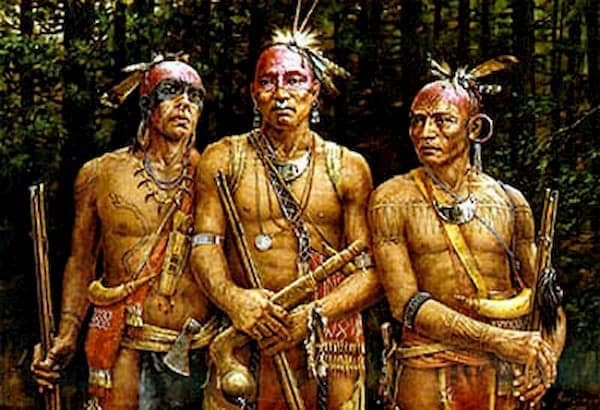Tanaghrisson Half-King, Indian Council of Six Nations delegate, warned the French not to trespass the Ohio Valley – no building or taking of Indian land.
Tanaghrisson the Half-king
Tanaghrisson the Half-King – known by various names: Tanaghrisson, Scruniyatha, Seruniyattha – (b. 1700 – d. 1754) – was a Seneca Indian and a respected leader among the Iroquois Indians, with a pivotal role at the start of the French and Indian War. He became known to the Europeans as the Half-King – a title also used for other historically, important Native Indian leaders – and was appointed delegate from the Indian Council of Six Nations to meet with official visitors to the Ohio region, whereas these visitors would request from Chief Half-King information, advice, approval, and assistance. Such notable men were Conrad Weiser, Christopher Gist, George Croghan, and George Washington – and Logstown was the arranged location for their petitions. Chief Half-King agreed to join Washington on his journey to the French forts in the Ohio Valley in 1753, and to assist him as the Iroquois Council delegate.
LOGSTOWN
24 November 1753
Washington moved along the river southeast two miles
Greeting Shingas of the Delawares with an easy smile,
Inviting the chief to join the Council at Logstown.
Shingas rode with Washington south to Council place
To gather with other Sachems of the Six Nations face to face–
To hear Washington’s message to the French from the British crown.
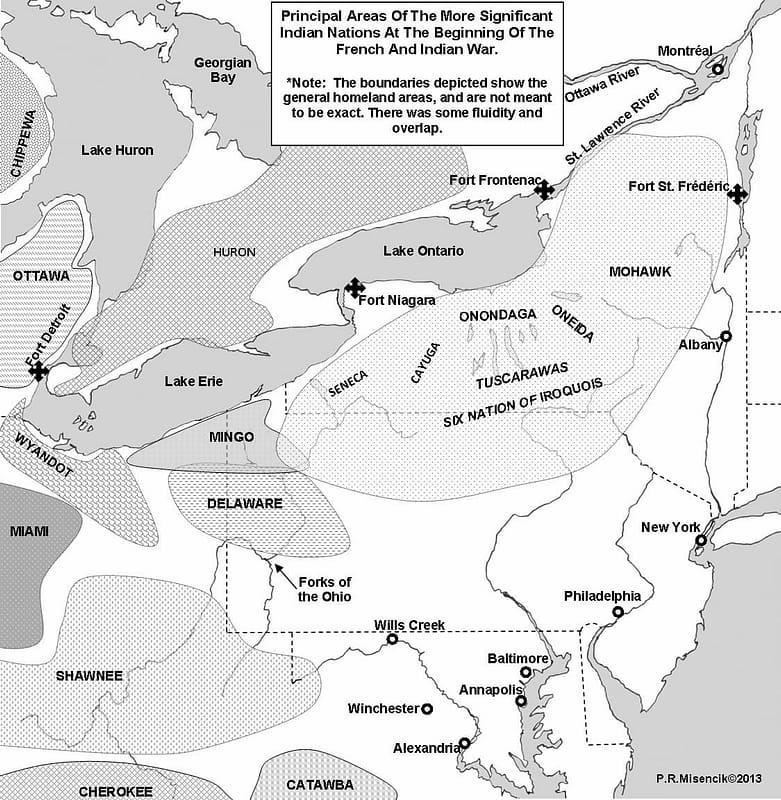
25 November 1753
Meanwhile, four French deserters headed for Logstown
Despite British presence, they arrived at sundown
Wanting no part of the French military situation.
Washington met the Frenchmen and took the opportunity
To probe what they knew about French troop activity–
Particularly Forts along the Mississippi location.
They ditched their company along the Mississippi
At Kaskaskia near the mouth of Ohio River artery,
To avoid French troops southwest of Lake Erie.
They told Washington French numbers and Forts,
Carriage guns, and communication between ports–
Omen of a perilous French rivalry.
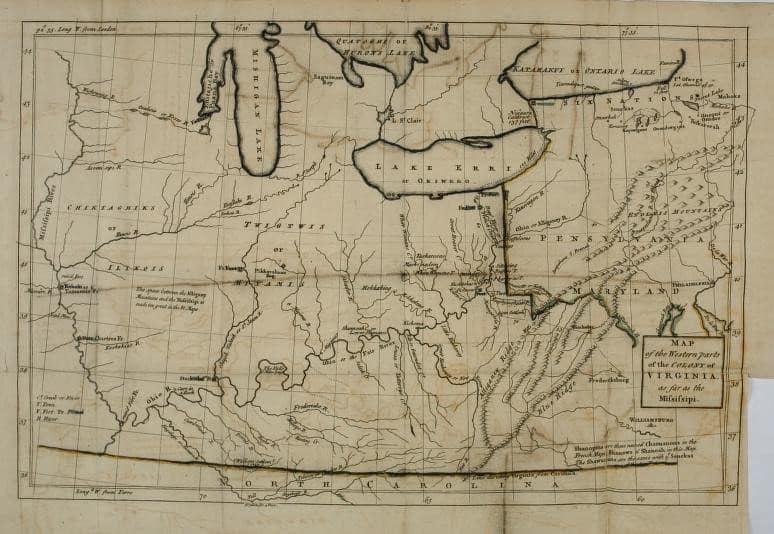
WASHINGTON AND Tanaghrisson the HALF-KING
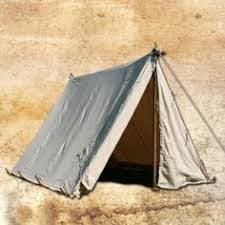
Inside his tent, Washington met with Tanaghrisson the Half-King,
The Indian elder elect, for a private meeting of an accounting
Between him and Marin, the late French Commander.
Tanaghrisson was thoughtful then said–
“Most sternly received by a churlish figurehead,
Who was disturbed and demanding in manner.”
Tanaghrisson sat etched against the tent’s candlelight,
His bird-feathered headdress full and upright
Behind a bald crown with short, braided hair.
Under his robe, a shell necklace adorned his chest,
Fur moccasins and leggings kept him warmly dressed–
A strong leader, diplomatic and wise in tribal affairs.
Washington inquired of him the distance and way
To nearest fort, but Half-King said delay
Journey now, best route impassable.
Many large, miry savannas over many miles,
Best to go by Venango – it would take a while,
Five nights very probable.
Half-King’s interpreter told Washington of a swap fire
Kindled at Montreal, where the Indians desired
The French to stay but not trespass Ohio land.
Half-King forewarned the French with all due civility
His tribes would not submit to their rod of hostility–
No building on or taking of Indian land.
Tanaghrisson Half-King was a member of the Council of Six Nations,
Main delegate to the Ohio Indian of the Iroquois Nation,
Including scout, adviser, informant, and ally.
Comrade to the English and enemy to the French–
He warned the Commander not to entrench
Upon this Land, best to listen and comply.
The Commander was insolent and refused to hear–
Down the river the French would go, he had no fear,
His forces could battle any resistance or blockade.
To him, the Indian was like mosquitoes and flies,
Annoying the French, and to withdraw unwise–
It was French land and he would seize it unafraid.
Half-King continued with his translator
And boldly asked Marin, as arbitrator,
Of two Englishmen lost and gone somewhere.
They were prisoners taken from Venango,
General Marin said, quite some time ago,
To Canada to learn of Virginia’s English affairs.
Tanaghrisson’s Indians asked after their Carolina brothers
And the boy taken from along the south-branch river,
As they heard of a white boy near Kaskaskia town.
Other Indians told them of a party of French Indians,
Who carried a white boy by Kaskaskia, wherein
they journeyed toward the Lakes northbound.
Tanaghrisson the HALF-KING AFFIRMED WASHINGTON AS BROTHER
26-27 November 1753
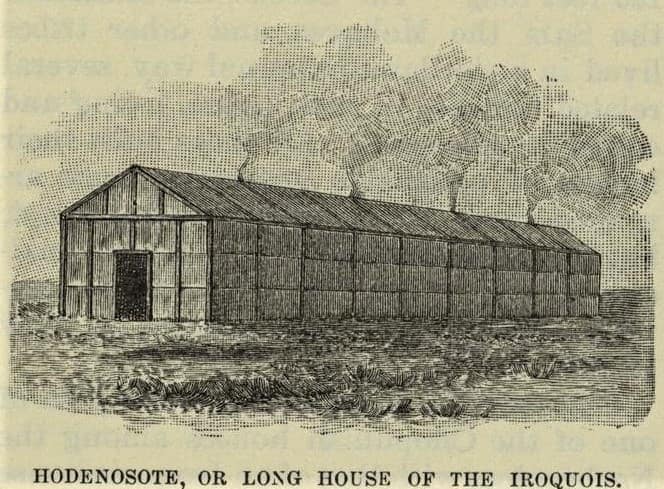
Washington met the Sachems of Nations
In Council at Long House to share information
Of great importance, a letter from the Virginia Governor.
Washington needed their assistance to get the letter
To the French Commandant; best road for travelers,
Food, and Indian guards against hostile aggressors.
Half-King considered Washington’s information
Then affirmed Washington as Brother to their Nation,
As one people, he’d approach the French with heart-in-hand.
Half-King hoped Washington would take his guidance,
Be ruled by it, stay the three nights with confidence
And be assured the Indian party would arrive as planned.
Washington opposed a longer stay as his business
Must be moved with haste, and he was dubious
About another delay – Washington graciously declined.
Half-King was not pleased with Washington’s decision,
He feared accidents could befall them on their mission
With no guards, he’d be faulted and his authority maligned.
Washington reconsidered Half-King’s position
And he did not want to insult their coalition,
So he returned a string of Wampum and stayed.
Washington wanted two men from their Nation
For travel next morning, but they postponed the delegation
To warn the Governor of French Indian renegades.
Chippewas, Ottowas, and Orundaks were the three
Nations of French Indians hardened with hostility,
Who raised the hatchet and hunted the English.
Half-King dispatched Indian runners early next day
For Shannoah Chiefs and Delawares to meet right away,
In full Council over French Indians against the British.
28 November 1753
Half-King returned to Washington’s tent that evening
With Monokatoocha and two other Sachems requesting
His business between the French and English.
Washington expected he must answer their
Concern, and he did so with sincerity and care
With the knowledge he must now relinquish.
Monokatoocha then told Washington more news
Of a French meeting days ago that he could use–
The French called together all Mingos and Delawares.
They were not to trouble the English but stay passive,
Unless it was in their minds to be fully combative
Against the British without the French in warfare.
Monokatoocha said the speech was from their
Interpreter, Captain Joncaire, big chief like bear
Of the French Army who lived in Venango.
The French intended to come down river
That fall but the waters grew cold and winter
Advanced, forcing them to shelter from snow.
Joncaire said war with the English could last three years–
The French would prevail, of course, yet still unclear
Was Indian mistrust that might rise equally strong.
If so, the French must join the English against the Indian,
And all the land between them divided, therein
The Ohio, would make themselves masters lifelong.
29 November 1753
It was early morning when Washington received Half-King
And Monokatoocha, insisting and urging
Him to stay another day, expecting Wampum that night.
If not, Half-King would not delay Washington any longer
But would send it as he traveled to fulfill his military order–
Washington reconsidered his options, his refusal was not right.
Washington knew returning Wampum was an Abolishment
Of Agreements, and to give that up was to clear all judgment
And dependence upon the French – such a move unwise.
Washington believed an offense offered at this crisis
Would bring an unfavorable outcome and useless
To resist another delay, so it was best to compromise.
It was late evening when Washington received Half-King
With the news Shannoahs had not yet arrived, adding
Old Chief, Jeskakake, was returning the Belt to the late
Commandant with a string of Wampum sent to Six Nations.
This was a third and last warning to the French, a declaration
Of hostility, if they remained on the Land and did not vacate.
30 November 1753
The Great Men met in their Council House the night before
To talk over Washington’s journey and who were best for
His convoy – they were three Chiefs and Best Hunter.
The Great Men told Washington it was not possible to send more–
It would raise French suspicions and ignite an uproar,
Causing the French to treat them with much disfavor.
FRENCH AND INDIAN WAR | Part 2
continued…
Updated 2020
References
The Journal of Major George Washington. 1754. Sent by the Hon. Robert Dinwiddie, Esq., his Majesty’s Lieutenant-Governor and Commander in Chief of Virginia, to the Commandant of the French Forces on Ohio. Williamsburgh printed; Reprinted London for T. Jeffreys, the Corner of St. Martin’s Lane.
https://archive.org/stream/journalofmajorge00wash#page/n9/mode/2up
Mount Vernon Ladies Association. 2015. The Journal of Major George Washington.
http://www.mountvernon.org/educational-resources/primary-sources-2/article/the-journal-of-major-george-washington/
Washington, George and Royster, Paul, editor, “The Journal of Major George Washington (1754)” (1754). Electronic Texts in American Studies. 33.
http://digitalcommons.unl.edu/etas/33
